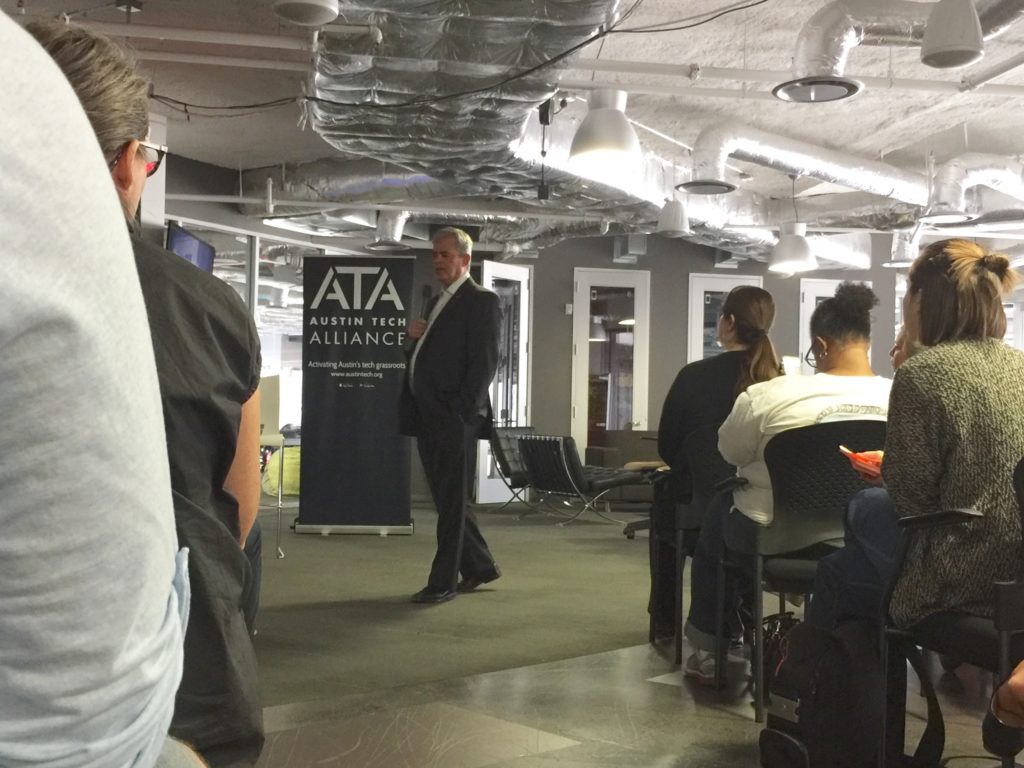Austin Mayor Steve Adler joined a full house at Capital Factory on Thursday, August 24, for Austin Tech Alliance’s #TechTownHall series — an ongoing effort to connect Austin’s tech sector with our community’s elected officials.
Many thanks to Downtown Austin Alliance for sponsoring.
Here are three takeaways from the evening’s discussion:
#1: Downtown Puzzle
Mayor Adler focused a lot of his time on the “Downtown Puzzle,” his approach to tackling linked issues in downtown, including homelessness, the Austin Convention Center, Waller Creek Linear Park, and downtown mobility.
In short, the plan is to use an increase in hotel taxes to have tourists pay to address a host of community challenges and expand the convention center. Chad Swiatecki with the Austin Monitor explains it well:
The puzzle concept would have City Council approve a 2 percentage-point increase to the Hotel Occupancy Tax — raising it to 17 percent total, which is the maximum allowed under state law — with the new money largely used to fund the roughly $600 million price tag for expanding the convention center.
The hotels would then agree to another 1 percentage-point increase to form a tourism public improvement district that would provide $4 million a year for homeless services until 2021, when retirement of existing debt on the convention center would increase the homeless funding to $8 million a year. Adler said the area hotel industry is on board with the tax increases that would levy 18 percent total on hotel bills because housing and serving the crowds overwhelming the Austin Resource Center for the Homeless will improve downtown guests’ stay.
The HOT increase would also provide more money for tourism and historic preservation efforts, with Adler specifying that $3 million per year would be made available for efforts to grow the city’s commercial music industry.
Adler summed up the puzzle by saying Austin could have up to $200 million over ten years to help provide permanent supportive housing for the homeless and address other community needs, but only if the Council moves forward with expanding the convention center.
#2: CodeNEXT is the best opportunity Austin has right now to impact affordability concerns
Mayor Adler was asked by the audience to provide an update on CodeNEXT, the ongoing effort to rewrite Austin’s Land Development Code — regulations that determine how land can be used throughout the city, including what can be built, where it can be built, and how much can (and cannot) be built. Land use is inextricably linked with affordability and mobility, Austin’s two largest challenges in Adler’s eyes.
Adler said that the community is currently waiting on the updated draft of CodeNEXT, which is set to be released on September 15.
Echoing remarks he made at an ATA event in March, Adler said that “CodeNEXT is incredibly important because the code we have today does not work. That said, I’m not going to vote for a code that works even worse than the code we have right now. The first draft that came out was not a code I could vote for.”
 If Austin wants to avoid the path of crippling unaffordability that other tech hubs like San Francisco, Seattle, Boston, and New York City suffer from, CodeNEXT is the community’s best opportunity.
If Austin wants to avoid the path of crippling unaffordability that other tech hubs like San Francisco, Seattle, Boston, and New York City suffer from, CodeNEXT is the community’s best opportunity.
But it won’t be easy.
Adler said that “we have to be more creative, we have to be more innovative, we have to find solutions that escaped other cities, and we need to do it before we lose what is the spirit and soul of the city.”
#3: Tech needs to continue to step up
We saw recently with the defeat of the bathroom bill that when Austin’s tech sector speaks out, we make a difference.
When asked what the tech sector could do to help address some intrenched civic challenges, Mayor Adler specifically referenced Big Data & Community Policing, an upcoming hackathon aimed at making data matter in community policing and other criminal justice reform efforts.
The tech sector should be more engaged in civic conversations, and Austin Tech Alliance’s mission to promote civic engagement has the goal of building an educated and engaged constituency across the city. Our memberships provide you with an instant-on policy engagement platform so that you and your team know what issues will impact Austin’s tech sector and how you can make your voice heard.
Full video
Check out the entire event below:

